International Human Resource Management Report: Shell Plc. Nigeria
VerifiedAdded on 2022/08/15
|20
|5674
|423
Report
AI Summary
This report examines the international human resource management (IHRM) challenges faced by Shell Plc. in Nigeria. It provides a detailed overview of Shell Plc., including its aims, objectives, and market presence. The report employs Hofstede's model and the Globe study to analyze cross-cultural differences between the Netherlands (Shell's headquarters) and Nigeria, focusing on power distance, individualism, masculinity, uncertainty avoidance, and long-term orientation. It identifies critical issues in cross-cultural management, such as communication barriers, cultural differences, and gaps in understanding roles and responsibilities. The report further discusses issues related to organizational culture, HR sourcing, performance management, and training and development, offering insights into how these factors can impact Shell Plc.'s operations in Nigeria. The report concludes by summarizing the key findings and implications for effective IHRM practices.
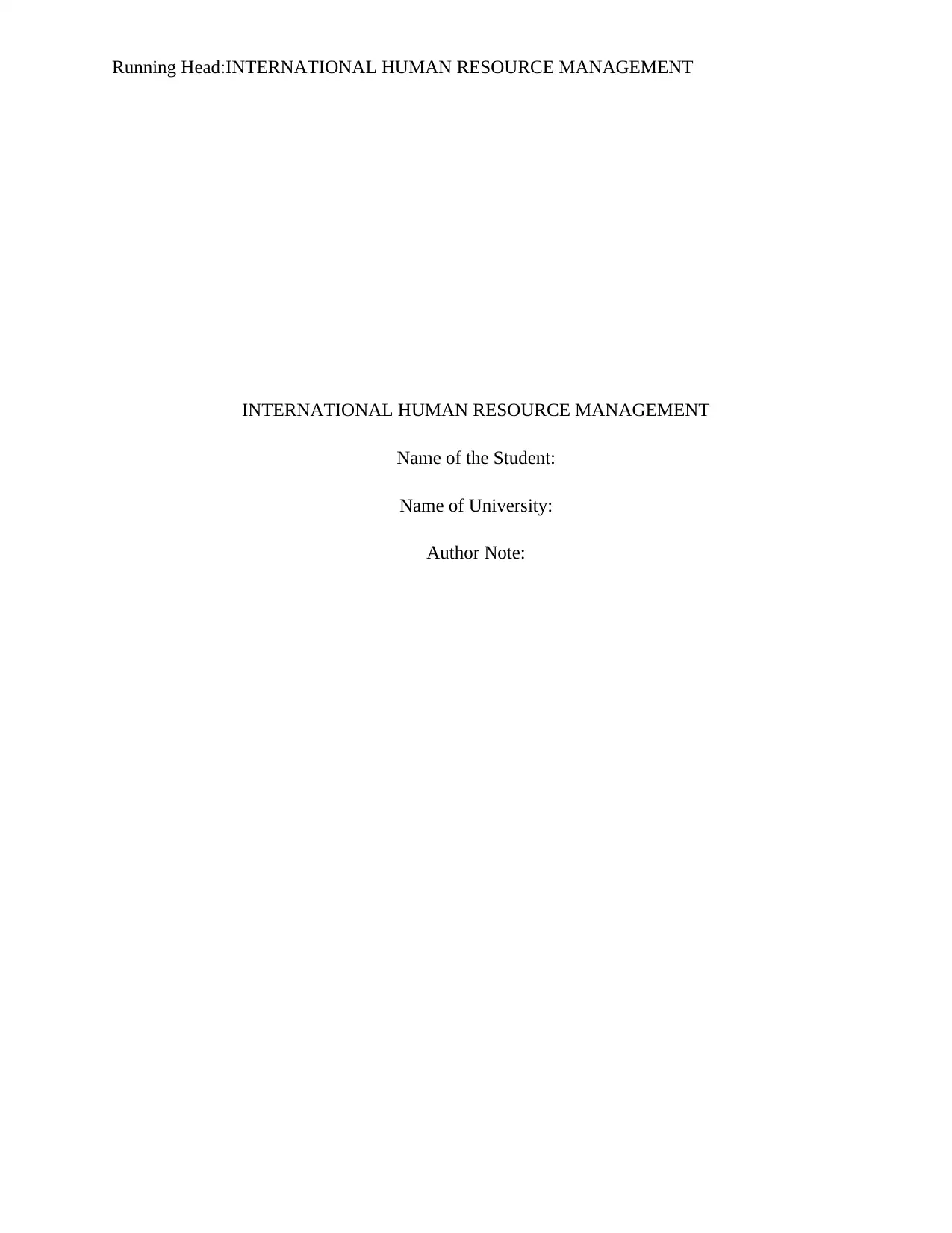
Running Head:INTERNATIONAL HUMAN RESOURCE MANAGEMENT
INTERNATIONAL HUMAN RESOURCE MANAGEMENT
Name of the Student:
Name of University:
Author Note:
INTERNATIONAL HUMAN RESOURCE MANAGEMENT
Name of the Student:
Name of University:
Author Note:
Paraphrase This Document
Need a fresh take? Get an instant paraphrase of this document with our AI Paraphraser
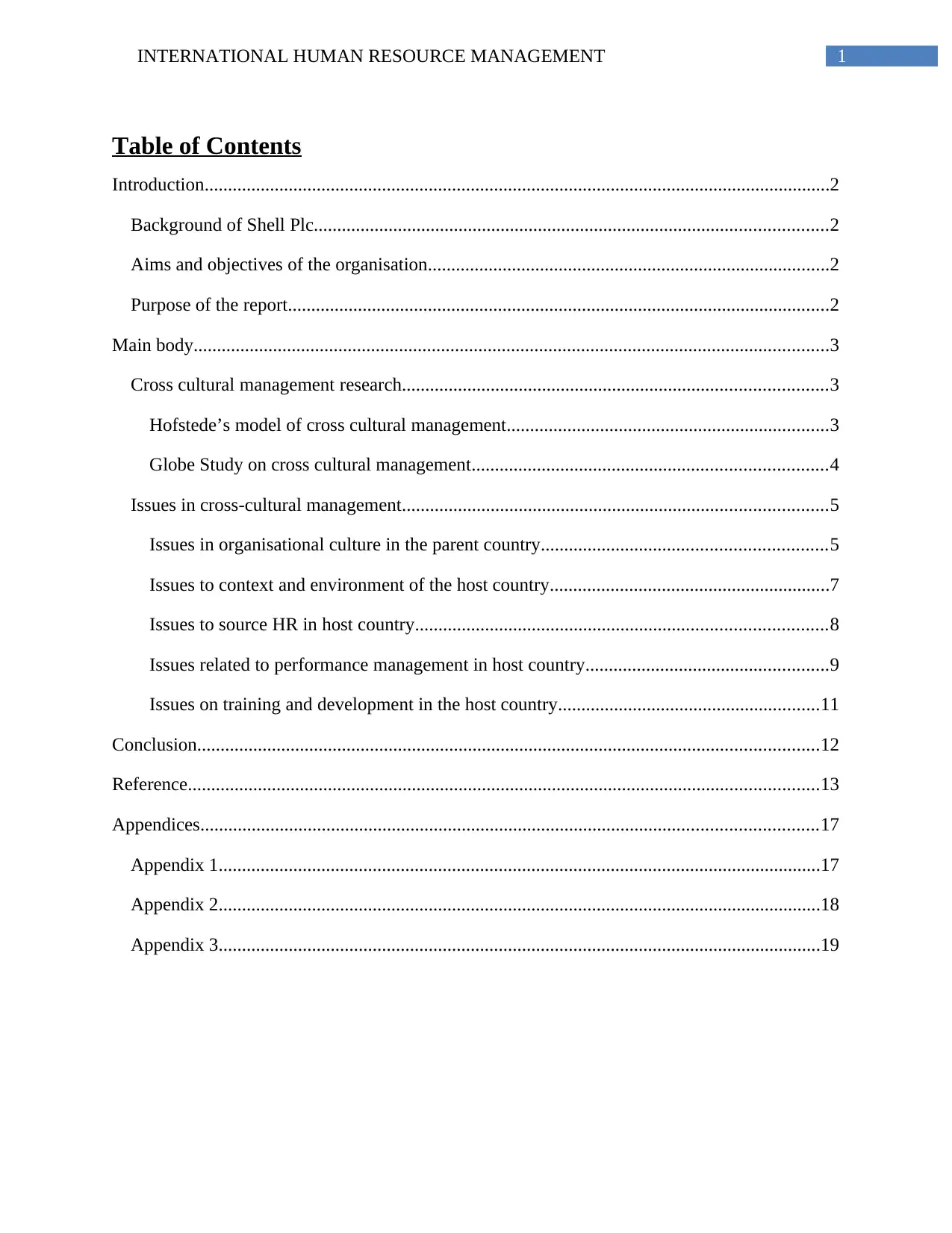
1INTERNATIONAL HUMAN RESOURCE MANAGEMENT
Table of Contents
Introduction......................................................................................................................................2
Background of Shell Plc..............................................................................................................2
Aims and objectives of the organisation......................................................................................2
Purpose of the report....................................................................................................................2
Main body........................................................................................................................................3
Cross cultural management research...........................................................................................3
Hofstede’s model of cross cultural management.....................................................................3
Globe Study on cross cultural management............................................................................4
Issues in cross-cultural management...........................................................................................5
Issues in organisational culture in the parent country.............................................................5
Issues to context and environment of the host country............................................................7
Issues to source HR in host country........................................................................................8
Issues related to performance management in host country....................................................9
Issues on training and development in the host country........................................................11
Conclusion.....................................................................................................................................12
Reference.......................................................................................................................................13
Appendices....................................................................................................................................17
Appendix 1.................................................................................................................................17
Appendix 2.................................................................................................................................18
Appendix 3.................................................................................................................................19
Table of Contents
Introduction......................................................................................................................................2
Background of Shell Plc..............................................................................................................2
Aims and objectives of the organisation......................................................................................2
Purpose of the report....................................................................................................................2
Main body........................................................................................................................................3
Cross cultural management research...........................................................................................3
Hofstede’s model of cross cultural management.....................................................................3
Globe Study on cross cultural management............................................................................4
Issues in cross-cultural management...........................................................................................5
Issues in organisational culture in the parent country.............................................................5
Issues to context and environment of the host country............................................................7
Issues to source HR in host country........................................................................................8
Issues related to performance management in host country....................................................9
Issues on training and development in the host country........................................................11
Conclusion.....................................................................................................................................12
Reference.......................................................................................................................................13
Appendices....................................................................................................................................17
Appendix 1.................................................................................................................................17
Appendix 2.................................................................................................................................18
Appendix 3.................................................................................................................................19
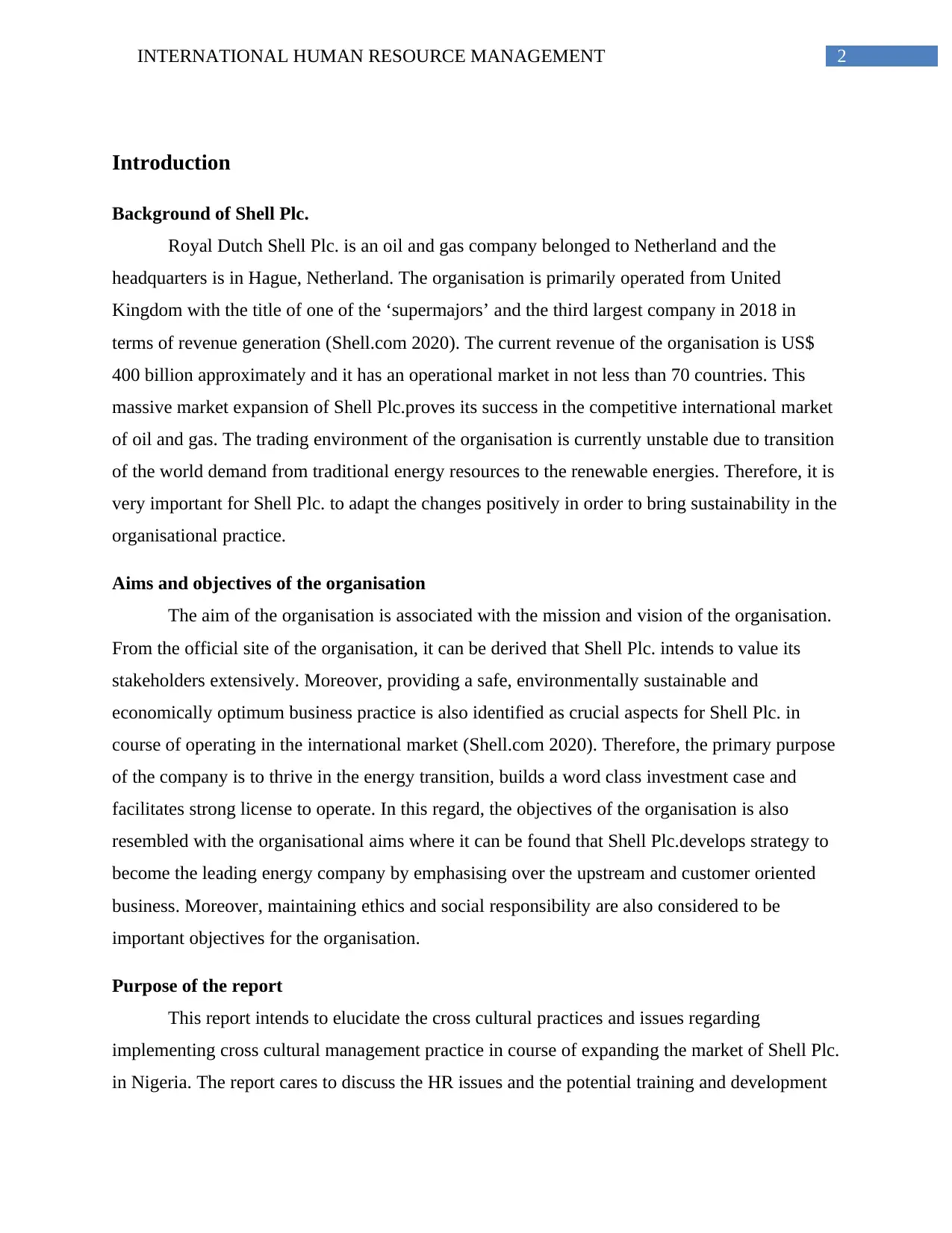
2INTERNATIONAL HUMAN RESOURCE MANAGEMENT
Introduction
Background of Shell Plc.
Royal Dutch Shell Plc. is an oil and gas company belonged to Netherland and the
headquarters is in Hague, Netherland. The organisation is primarily operated from United
Kingdom with the title of one of the ‘supermajors’ and the third largest company in 2018 in
terms of revenue generation (Shell.com 2020). The current revenue of the organisation is US$
400 billion approximately and it has an operational market in not less than 70 countries. This
massive market expansion of Shell Plc.proves its success in the competitive international market
of oil and gas. The trading environment of the organisation is currently unstable due to transition
of the world demand from traditional energy resources to the renewable energies. Therefore, it is
very important for Shell Plc. to adapt the changes positively in order to bring sustainability in the
organisational practice.
Aims and objectives of the organisation
The aim of the organisation is associated with the mission and vision of the organisation.
From the official site of the organisation, it can be derived that Shell Plc. intends to value its
stakeholders extensively. Moreover, providing a safe, environmentally sustainable and
economically optimum business practice is also identified as crucial aspects for Shell Plc. in
course of operating in the international market (Shell.com 2020). Therefore, the primary purpose
of the company is to thrive in the energy transition, builds a word class investment case and
facilitates strong license to operate. In this regard, the objectives of the organisation is also
resembled with the organisational aims where it can be found that Shell Plc.develops strategy to
become the leading energy company by emphasising over the upstream and customer oriented
business. Moreover, maintaining ethics and social responsibility are also considered to be
important objectives for the organisation.
Purpose of the report
This report intends to elucidate the cross cultural practices and issues regarding
implementing cross cultural management practice in course of expanding the market of Shell Plc.
in Nigeria. The report cares to discuss the HR issues and the potential training and development
Introduction
Background of Shell Plc.
Royal Dutch Shell Plc. is an oil and gas company belonged to Netherland and the
headquarters is in Hague, Netherland. The organisation is primarily operated from United
Kingdom with the title of one of the ‘supermajors’ and the third largest company in 2018 in
terms of revenue generation (Shell.com 2020). The current revenue of the organisation is US$
400 billion approximately and it has an operational market in not less than 70 countries. This
massive market expansion of Shell Plc.proves its success in the competitive international market
of oil and gas. The trading environment of the organisation is currently unstable due to transition
of the world demand from traditional energy resources to the renewable energies. Therefore, it is
very important for Shell Plc. to adapt the changes positively in order to bring sustainability in the
organisational practice.
Aims and objectives of the organisation
The aim of the organisation is associated with the mission and vision of the organisation.
From the official site of the organisation, it can be derived that Shell Plc. intends to value its
stakeholders extensively. Moreover, providing a safe, environmentally sustainable and
economically optimum business practice is also identified as crucial aspects for Shell Plc. in
course of operating in the international market (Shell.com 2020). Therefore, the primary purpose
of the company is to thrive in the energy transition, builds a word class investment case and
facilitates strong license to operate. In this regard, the objectives of the organisation is also
resembled with the organisational aims where it can be found that Shell Plc.develops strategy to
become the leading energy company by emphasising over the upstream and customer oriented
business. Moreover, maintaining ethics and social responsibility are also considered to be
important objectives for the organisation.
Purpose of the report
This report intends to elucidate the cross cultural practices and issues regarding
implementing cross cultural management practice in course of expanding the market of Shell Plc.
in Nigeria. The report cares to discuss the HR issues and the potential training and development
⊘ This is a preview!⊘
Do you want full access?
Subscribe today to unlock all pages.

Trusted by 1+ million students worldwide
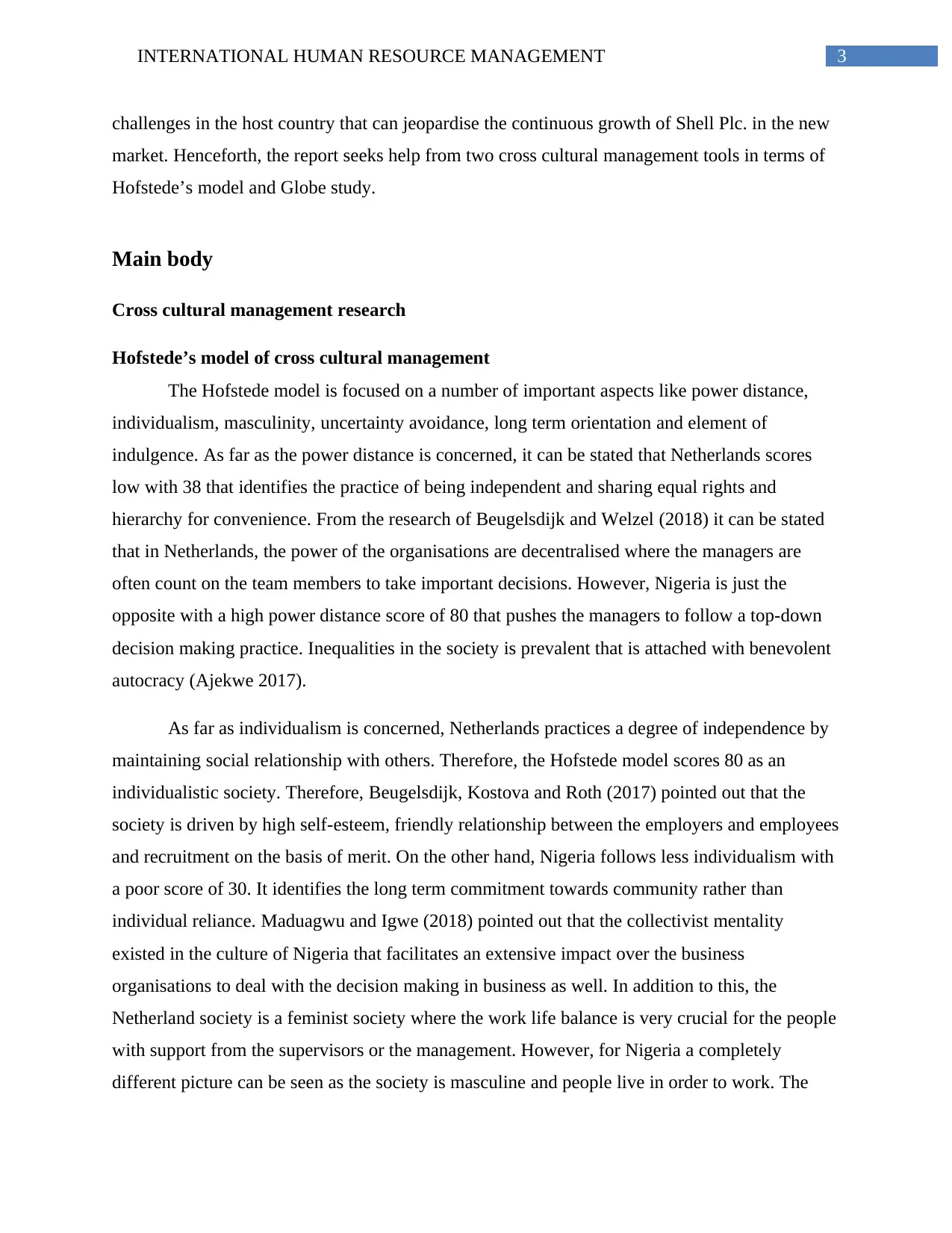
3INTERNATIONAL HUMAN RESOURCE MANAGEMENT
challenges in the host country that can jeopardise the continuous growth of Shell Plc. in the new
market. Henceforth, the report seeks help from two cross cultural management tools in terms of
Hofstede’s model and Globe study.
Main body
Cross cultural management research
Hofstede’s model of cross cultural management
The Hofstede model is focused on a number of important aspects like power distance,
individualism, masculinity, uncertainty avoidance, long term orientation and element of
indulgence. As far as the power distance is concerned, it can be stated that Netherlands scores
low with 38 that identifies the practice of being independent and sharing equal rights and
hierarchy for convenience. From the research of Beugelsdijk and Welzel (2018) it can be stated
that in Netherlands, the power of the organisations are decentralised where the managers are
often count on the team members to take important decisions. However, Nigeria is just the
opposite with a high power distance score of 80 that pushes the managers to follow a top-down
decision making practice. Inequalities in the society is prevalent that is attached with benevolent
autocracy (Ajekwe 2017).
As far as individualism is concerned, Netherlands practices a degree of independence by
maintaining social relationship with others. Therefore, the Hofstede model scores 80 as an
individualistic society. Therefore, Beugelsdijk, Kostova and Roth (2017) pointed out that the
society is driven by high self-esteem, friendly relationship between the employers and employees
and recruitment on the basis of merit. On the other hand, Nigeria follows less individualism with
a poor score of 30. It identifies the long term commitment towards community rather than
individual reliance. Maduagwu and Igwe (2018) pointed out that the collectivist mentality
existed in the culture of Nigeria that facilitates an extensive impact over the business
organisations to deal with the decision making in business as well. In addition to this, the
Netherland society is a feminist society where the work life balance is very crucial for the people
with support from the supervisors or the management. However, for Nigeria a completely
different picture can be seen as the society is masculine and people live in order to work. The
challenges in the host country that can jeopardise the continuous growth of Shell Plc. in the new
market. Henceforth, the report seeks help from two cross cultural management tools in terms of
Hofstede’s model and Globe study.
Main body
Cross cultural management research
Hofstede’s model of cross cultural management
The Hofstede model is focused on a number of important aspects like power distance,
individualism, masculinity, uncertainty avoidance, long term orientation and element of
indulgence. As far as the power distance is concerned, it can be stated that Netherlands scores
low with 38 that identifies the practice of being independent and sharing equal rights and
hierarchy for convenience. From the research of Beugelsdijk and Welzel (2018) it can be stated
that in Netherlands, the power of the organisations are decentralised where the managers are
often count on the team members to take important decisions. However, Nigeria is just the
opposite with a high power distance score of 80 that pushes the managers to follow a top-down
decision making practice. Inequalities in the society is prevalent that is attached with benevolent
autocracy (Ajekwe 2017).
As far as individualism is concerned, Netherlands practices a degree of independence by
maintaining social relationship with others. Therefore, the Hofstede model scores 80 as an
individualistic society. Therefore, Beugelsdijk, Kostova and Roth (2017) pointed out that the
society is driven by high self-esteem, friendly relationship between the employers and employees
and recruitment on the basis of merit. On the other hand, Nigeria follows less individualism with
a poor score of 30. It identifies the long term commitment towards community rather than
individual reliance. Maduagwu and Igwe (2018) pointed out that the collectivist mentality
existed in the culture of Nigeria that facilitates an extensive impact over the business
organisations to deal with the decision making in business as well. In addition to this, the
Netherland society is a feminist society where the work life balance is very crucial for the people
with support from the supervisors or the management. However, for Nigeria a completely
different picture can be seen as the society is masculine and people live in order to work. The
Paraphrase This Document
Need a fresh take? Get an instant paraphrase of this document with our AI Paraphraser
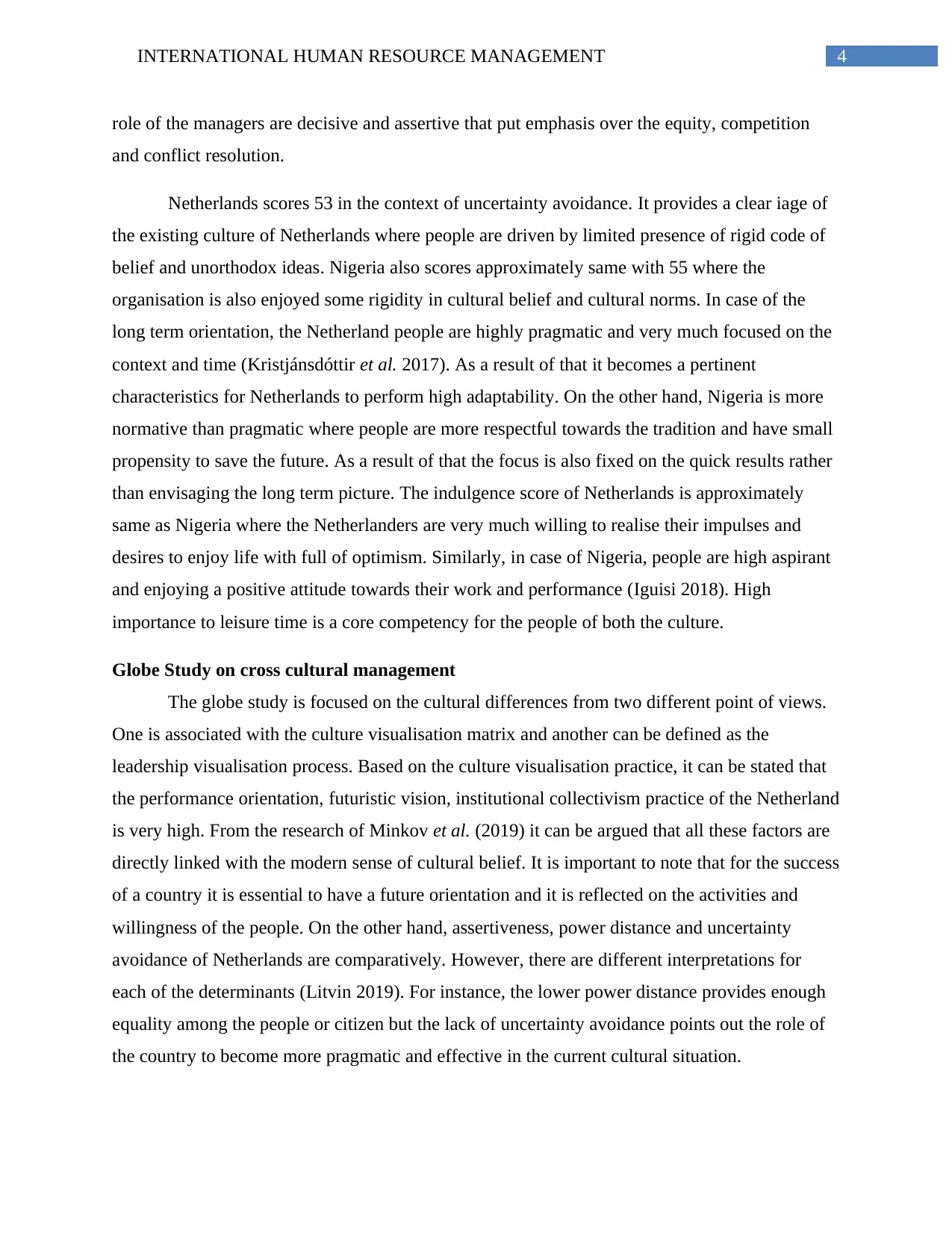
4INTERNATIONAL HUMAN RESOURCE MANAGEMENT
role of the managers are decisive and assertive that put emphasis over the equity, competition
and conflict resolution.
Netherlands scores 53 in the context of uncertainty avoidance. It provides a clear iage of
the existing culture of Netherlands where people are driven by limited presence of rigid code of
belief and unorthodox ideas. Nigeria also scores approximately same with 55 where the
organisation is also enjoyed some rigidity in cultural belief and cultural norms. In case of the
long term orientation, the Netherland people are highly pragmatic and very much focused on the
context and time (Kristjánsdóttir et al. 2017). As a result of that it becomes a pertinent
characteristics for Netherlands to perform high adaptability. On the other hand, Nigeria is more
normative than pragmatic where people are more respectful towards the tradition and have small
propensity to save the future. As a result of that the focus is also fixed on the quick results rather
than envisaging the long term picture. The indulgence score of Netherlands is approximately
same as Nigeria where the Netherlanders are very much willing to realise their impulses and
desires to enjoy life with full of optimism. Similarly, in case of Nigeria, people are high aspirant
and enjoying a positive attitude towards their work and performance (Iguisi 2018). High
importance to leisure time is a core competency for the people of both the culture.
Globe Study on cross cultural management
The globe study is focused on the cultural differences from two different point of views.
One is associated with the culture visualisation matrix and another can be defined as the
leadership visualisation process. Based on the culture visualisation practice, it can be stated that
the performance orientation, futuristic vision, institutional collectivism practice of the Netherland
is very high. From the research of Minkov et al. (2019) it can be argued that all these factors are
directly linked with the modern sense of cultural belief. It is important to note that for the success
of a country it is essential to have a future orientation and it is reflected on the activities and
willingness of the people. On the other hand, assertiveness, power distance and uncertainty
avoidance of Netherlands are comparatively. However, there are different interpretations for
each of the determinants (Litvin 2019). For instance, the lower power distance provides enough
equality among the people or citizen but the lack of uncertainty avoidance points out the role of
the country to become more pragmatic and effective in the current cultural situation.
role of the managers are decisive and assertive that put emphasis over the equity, competition
and conflict resolution.
Netherlands scores 53 in the context of uncertainty avoidance. It provides a clear iage of
the existing culture of Netherlands where people are driven by limited presence of rigid code of
belief and unorthodox ideas. Nigeria also scores approximately same with 55 where the
organisation is also enjoyed some rigidity in cultural belief and cultural norms. In case of the
long term orientation, the Netherland people are highly pragmatic and very much focused on the
context and time (Kristjánsdóttir et al. 2017). As a result of that it becomes a pertinent
characteristics for Netherlands to perform high adaptability. On the other hand, Nigeria is more
normative than pragmatic where people are more respectful towards the tradition and have small
propensity to save the future. As a result of that the focus is also fixed on the quick results rather
than envisaging the long term picture. The indulgence score of Netherlands is approximately
same as Nigeria where the Netherlanders are very much willing to realise their impulses and
desires to enjoy life with full of optimism. Similarly, in case of Nigeria, people are high aspirant
and enjoying a positive attitude towards their work and performance (Iguisi 2018). High
importance to leisure time is a core competency for the people of both the culture.
Globe Study on cross cultural management
The globe study is focused on the cultural differences from two different point of views.
One is associated with the culture visualisation matrix and another can be defined as the
leadership visualisation process. Based on the culture visualisation practice, it can be stated that
the performance orientation, futuristic vision, institutional collectivism practice of the Netherland
is very high. From the research of Minkov et al. (2019) it can be argued that all these factors are
directly linked with the modern sense of cultural belief. It is important to note that for the success
of a country it is essential to have a future orientation and it is reflected on the activities and
willingness of the people. On the other hand, assertiveness, power distance and uncertainty
avoidance of Netherlands are comparatively. However, there are different interpretations for
each of the determinants (Litvin 2019). For instance, the lower power distance provides enough
equality among the people or citizen but the lack of uncertainty avoidance points out the role of
the country to become more pragmatic and effective in the current cultural situation.
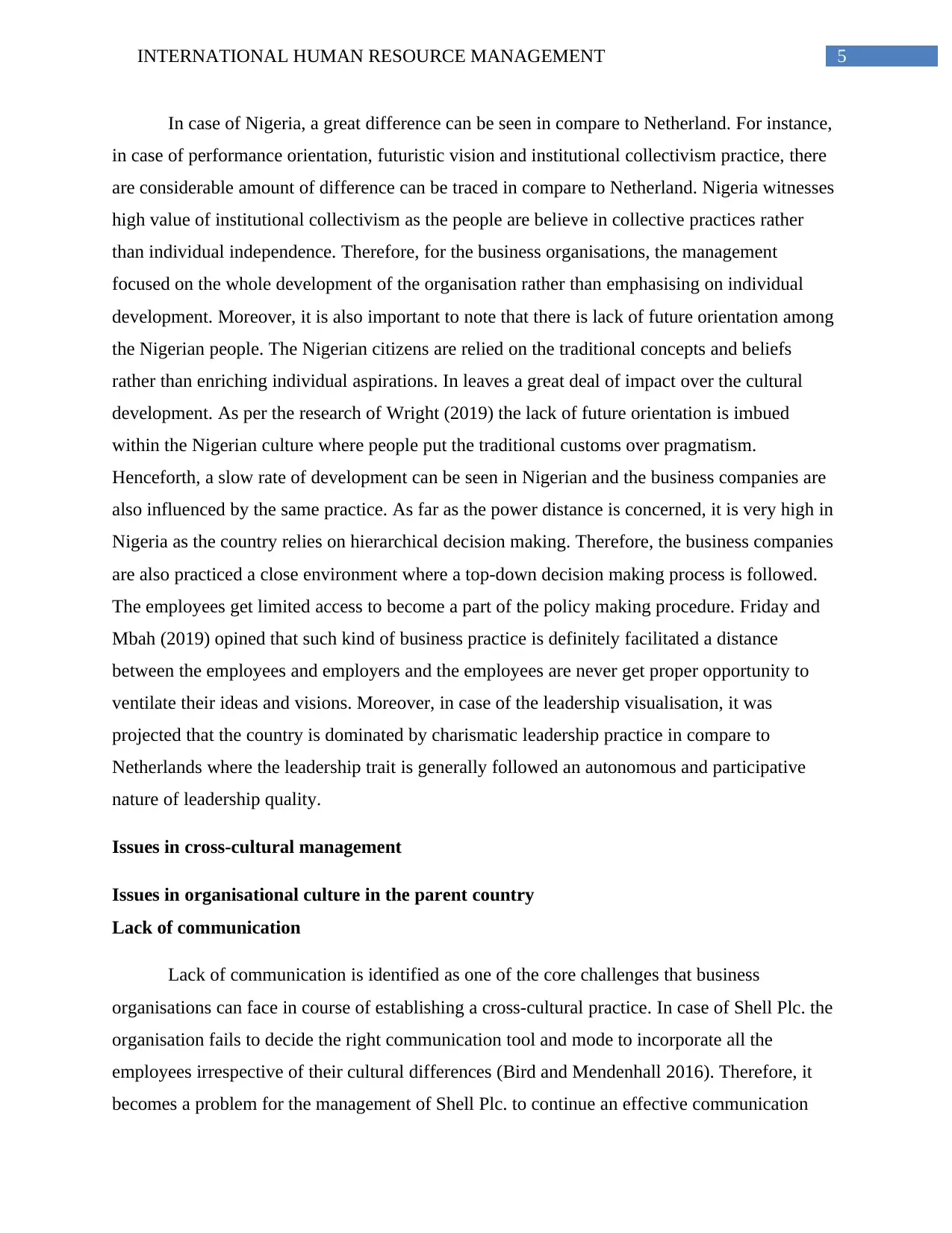
5INTERNATIONAL HUMAN RESOURCE MANAGEMENT
In case of Nigeria, a great difference can be seen in compare to Netherland. For instance,
in case of performance orientation, futuristic vision and institutional collectivism practice, there
are considerable amount of difference can be traced in compare to Netherland. Nigeria witnesses
high value of institutional collectivism as the people are believe in collective practices rather
than individual independence. Therefore, for the business organisations, the management
focused on the whole development of the organisation rather than emphasising on individual
development. Moreover, it is also important to note that there is lack of future orientation among
the Nigerian people. The Nigerian citizens are relied on the traditional concepts and beliefs
rather than enriching individual aspirations. In leaves a great deal of impact over the cultural
development. As per the research of Wright (2019) the lack of future orientation is imbued
within the Nigerian culture where people put the traditional customs over pragmatism.
Henceforth, a slow rate of development can be seen in Nigerian and the business companies are
also influenced by the same practice. As far as the power distance is concerned, it is very high in
Nigeria as the country relies on hierarchical decision making. Therefore, the business companies
are also practiced a close environment where a top-down decision making process is followed.
The employees get limited access to become a part of the policy making procedure. Friday and
Mbah (2019) opined that such kind of business practice is definitely facilitated a distance
between the employees and employers and the employees are never get proper opportunity to
ventilate their ideas and visions. Moreover, in case of the leadership visualisation, it was
projected that the country is dominated by charismatic leadership practice in compare to
Netherlands where the leadership trait is generally followed an autonomous and participative
nature of leadership quality.
Issues in cross-cultural management
Issues in organisational culture in the parent country
Lack of communication
Lack of communication is identified as one of the core challenges that business
organisations can face in course of establishing a cross-cultural practice. In case of Shell Plc. the
organisation fails to decide the right communication tool and mode to incorporate all the
employees irrespective of their cultural differences (Bird and Mendenhall 2016). Therefore, it
becomes a problem for the management of Shell Plc. to continue an effective communication
In case of Nigeria, a great difference can be seen in compare to Netherland. For instance,
in case of performance orientation, futuristic vision and institutional collectivism practice, there
are considerable amount of difference can be traced in compare to Netherland. Nigeria witnesses
high value of institutional collectivism as the people are believe in collective practices rather
than individual independence. Therefore, for the business organisations, the management
focused on the whole development of the organisation rather than emphasising on individual
development. Moreover, it is also important to note that there is lack of future orientation among
the Nigerian people. The Nigerian citizens are relied on the traditional concepts and beliefs
rather than enriching individual aspirations. In leaves a great deal of impact over the cultural
development. As per the research of Wright (2019) the lack of future orientation is imbued
within the Nigerian culture where people put the traditional customs over pragmatism.
Henceforth, a slow rate of development can be seen in Nigerian and the business companies are
also influenced by the same practice. As far as the power distance is concerned, it is very high in
Nigeria as the country relies on hierarchical decision making. Therefore, the business companies
are also practiced a close environment where a top-down decision making process is followed.
The employees get limited access to become a part of the policy making procedure. Friday and
Mbah (2019) opined that such kind of business practice is definitely facilitated a distance
between the employees and employers and the employees are never get proper opportunity to
ventilate their ideas and visions. Moreover, in case of the leadership visualisation, it was
projected that the country is dominated by charismatic leadership practice in compare to
Netherlands where the leadership trait is generally followed an autonomous and participative
nature of leadership quality.
Issues in cross-cultural management
Issues in organisational culture in the parent country
Lack of communication
Lack of communication is identified as one of the core challenges that business
organisations can face in course of establishing a cross-cultural practice. In case of Shell Plc. the
organisation fails to decide the right communication tool and mode to incorporate all the
employees irrespective of their cultural differences (Bird and Mendenhall 2016). Therefore, it
becomes a problem for the management of Shell Plc. to continue an effective communication
⊘ This is a preview!⊘
Do you want full access?
Subscribe today to unlock all pages.

Trusted by 1+ million students worldwide
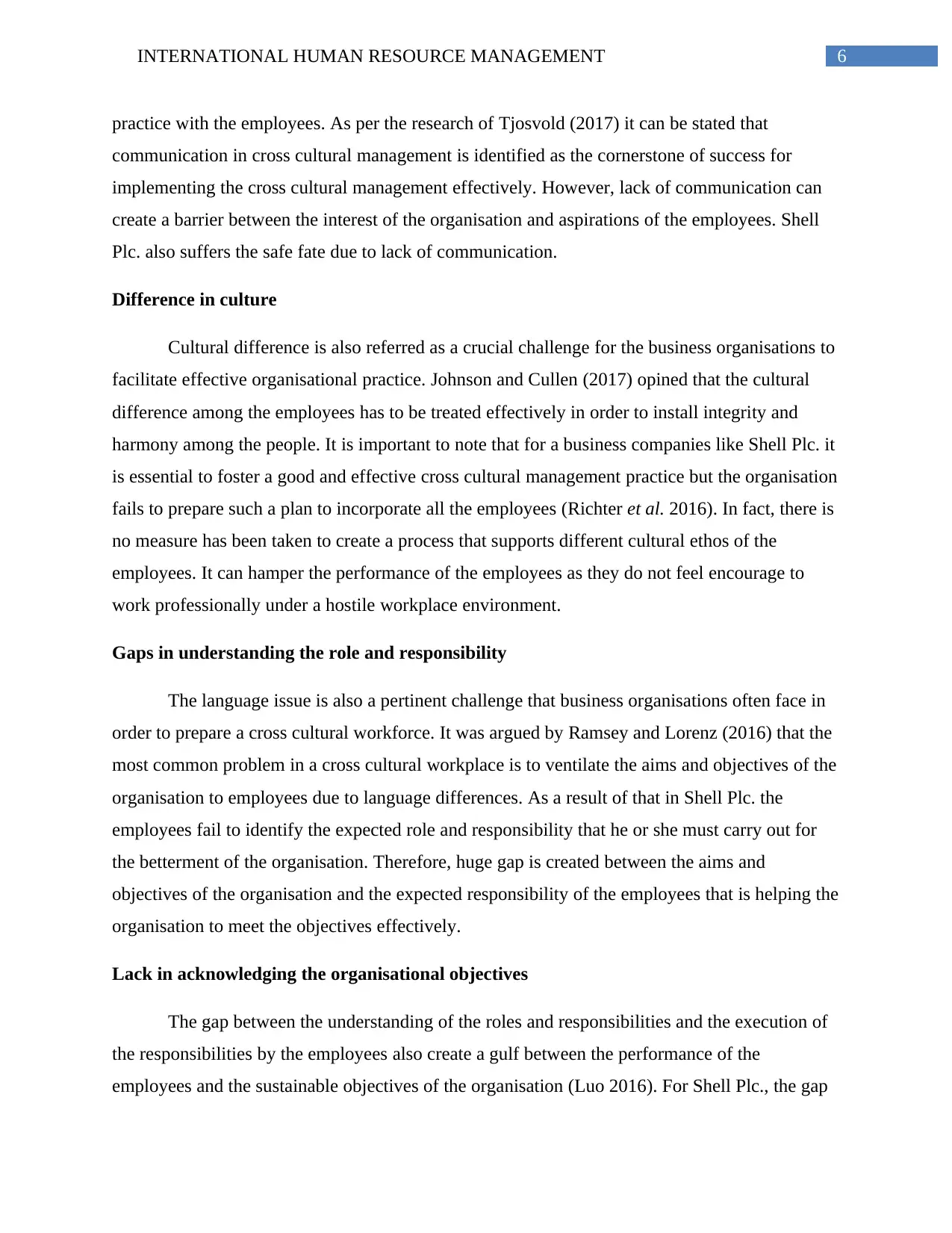
6INTERNATIONAL HUMAN RESOURCE MANAGEMENT
practice with the employees. As per the research of Tjosvold (2017) it can be stated that
communication in cross cultural management is identified as the cornerstone of success for
implementing the cross cultural management effectively. However, lack of communication can
create a barrier between the interest of the organisation and aspirations of the employees. Shell
Plc. also suffers the safe fate due to lack of communication.
Difference in culture
Cultural difference is also referred as a crucial challenge for the business organisations to
facilitate effective organisational practice. Johnson and Cullen (2017) opined that the cultural
difference among the employees has to be treated effectively in order to install integrity and
harmony among the people. It is important to note that for a business companies like Shell Plc. it
is essential to foster a good and effective cross cultural management practice but the organisation
fails to prepare such a plan to incorporate all the employees (Richter et al. 2016). In fact, there is
no measure has been taken to create a process that supports different cultural ethos of the
employees. It can hamper the performance of the employees as they do not feel encourage to
work professionally under a hostile workplace environment.
Gaps in understanding the role and responsibility
The language issue is also a pertinent challenge that business organisations often face in
order to prepare a cross cultural workforce. It was argued by Ramsey and Lorenz (2016) that the
most common problem in a cross cultural workplace is to ventilate the aims and objectives of the
organisation to employees due to language differences. As a result of that in Shell Plc. the
employees fail to identify the expected role and responsibility that he or she must carry out for
the betterment of the organisation. Therefore, huge gap is created between the aims and
objectives of the organisation and the expected responsibility of the employees that is helping the
organisation to meet the objectives effectively.
Lack in acknowledging the organisational objectives
The gap between the understanding of the roles and responsibilities and the execution of
the responsibilities by the employees also create a gulf between the performance of the
employees and the sustainable objectives of the organisation (Luo 2016). For Shell Plc., the gap
practice with the employees. As per the research of Tjosvold (2017) it can be stated that
communication in cross cultural management is identified as the cornerstone of success for
implementing the cross cultural management effectively. However, lack of communication can
create a barrier between the interest of the organisation and aspirations of the employees. Shell
Plc. also suffers the safe fate due to lack of communication.
Difference in culture
Cultural difference is also referred as a crucial challenge for the business organisations to
facilitate effective organisational practice. Johnson and Cullen (2017) opined that the cultural
difference among the employees has to be treated effectively in order to install integrity and
harmony among the people. It is important to note that for a business companies like Shell Plc. it
is essential to foster a good and effective cross cultural management practice but the organisation
fails to prepare such a plan to incorporate all the employees (Richter et al. 2016). In fact, there is
no measure has been taken to create a process that supports different cultural ethos of the
employees. It can hamper the performance of the employees as they do not feel encourage to
work professionally under a hostile workplace environment.
Gaps in understanding the role and responsibility
The language issue is also a pertinent challenge that business organisations often face in
order to prepare a cross cultural workforce. It was argued by Ramsey and Lorenz (2016) that the
most common problem in a cross cultural workplace is to ventilate the aims and objectives of the
organisation to employees due to language differences. As a result of that in Shell Plc. the
employees fail to identify the expected role and responsibility that he or she must carry out for
the betterment of the organisation. Therefore, huge gap is created between the aims and
objectives of the organisation and the expected responsibility of the employees that is helping the
organisation to meet the objectives effectively.
Lack in acknowledging the organisational objectives
The gap between the understanding of the roles and responsibilities and the execution of
the responsibilities by the employees also create a gulf between the performance of the
employees and the sustainable objectives of the organisation (Luo 2016). For Shell Plc., the gap
Paraphrase This Document
Need a fresh take? Get an instant paraphrase of this document with our AI Paraphraser
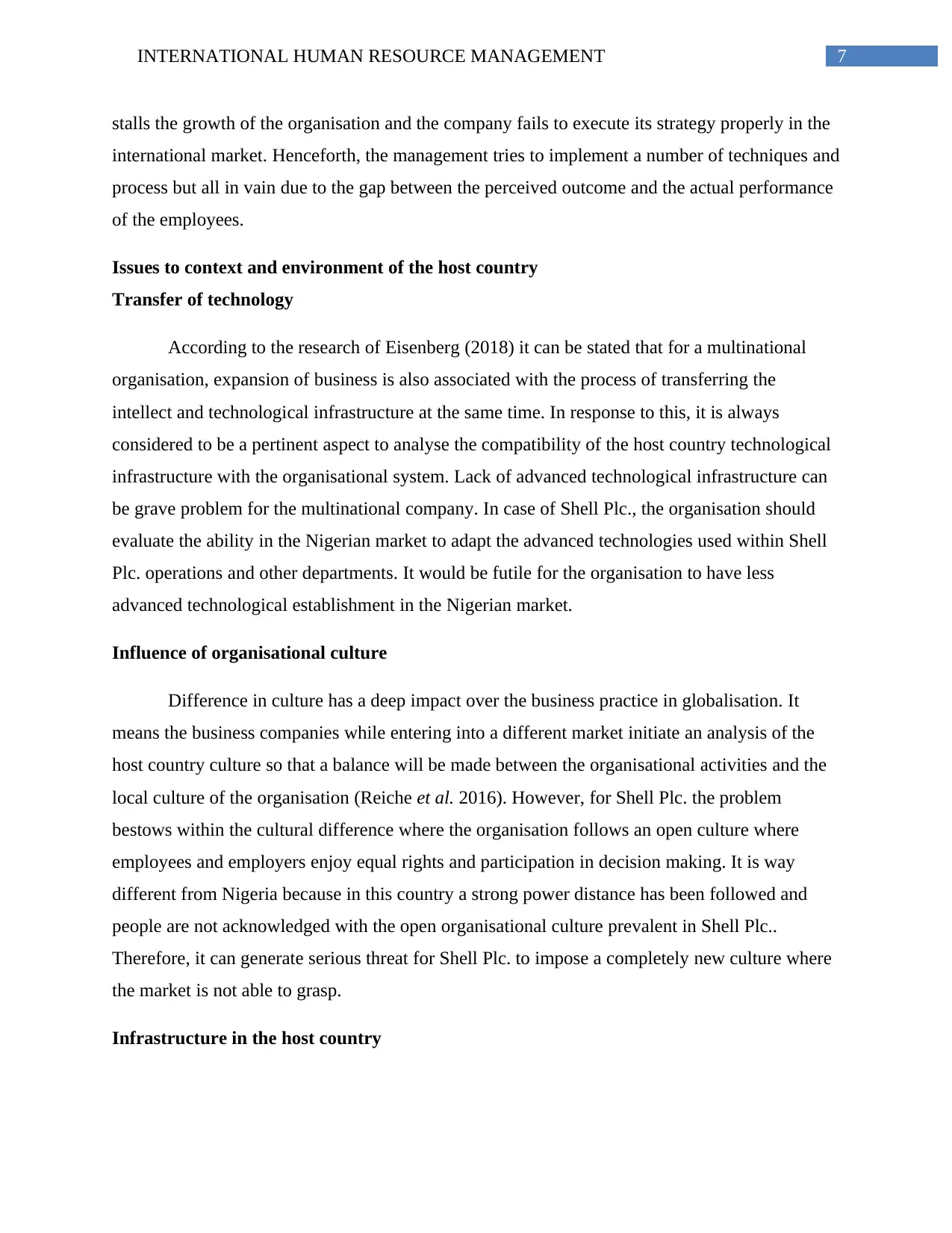
7INTERNATIONAL HUMAN RESOURCE MANAGEMENT
stalls the growth of the organisation and the company fails to execute its strategy properly in the
international market. Henceforth, the management tries to implement a number of techniques and
process but all in vain due to the gap between the perceived outcome and the actual performance
of the employees.
Issues to context and environment of the host country
Transfer of technology
According to the research of Eisenberg (2018) it can be stated that for a multinational
organisation, expansion of business is also associated with the process of transferring the
intellect and technological infrastructure at the same time. In response to this, it is always
considered to be a pertinent aspect to analyse the compatibility of the host country technological
infrastructure with the organisational system. Lack of advanced technological infrastructure can
be grave problem for the multinational company. In case of Shell Plc., the organisation should
evaluate the ability in the Nigerian market to adapt the advanced technologies used within Shell
Plc. operations and other departments. It would be futile for the organisation to have less
advanced technological establishment in the Nigerian market.
Influence of organisational culture
Difference in culture has a deep impact over the business practice in globalisation. It
means the business companies while entering into a different market initiate an analysis of the
host country culture so that a balance will be made between the organisational activities and the
local culture of the organisation (Reiche et al. 2016). However, for Shell Plc. the problem
bestows within the cultural difference where the organisation follows an open culture where
employees and employers enjoy equal rights and participation in decision making. It is way
different from Nigeria because in this country a strong power distance has been followed and
people are not acknowledged with the open organisational culture prevalent in Shell Plc..
Therefore, it can generate serious threat for Shell Plc. to impose a completely new culture where
the market is not able to grasp.
Infrastructure in the host country
stalls the growth of the organisation and the company fails to execute its strategy properly in the
international market. Henceforth, the management tries to implement a number of techniques and
process but all in vain due to the gap between the perceived outcome and the actual performance
of the employees.
Issues to context and environment of the host country
Transfer of technology
According to the research of Eisenberg (2018) it can be stated that for a multinational
organisation, expansion of business is also associated with the process of transferring the
intellect and technological infrastructure at the same time. In response to this, it is always
considered to be a pertinent aspect to analyse the compatibility of the host country technological
infrastructure with the organisational system. Lack of advanced technological infrastructure can
be grave problem for the multinational company. In case of Shell Plc., the organisation should
evaluate the ability in the Nigerian market to adapt the advanced technologies used within Shell
Plc. operations and other departments. It would be futile for the organisation to have less
advanced technological establishment in the Nigerian market.
Influence of organisational culture
Difference in culture has a deep impact over the business practice in globalisation. It
means the business companies while entering into a different market initiate an analysis of the
host country culture so that a balance will be made between the organisational activities and the
local culture of the organisation (Reiche et al. 2016). However, for Shell Plc. the problem
bestows within the cultural difference where the organisation follows an open culture where
employees and employers enjoy equal rights and participation in decision making. It is way
different from Nigeria because in this country a strong power distance has been followed and
people are not acknowledged with the open organisational culture prevalent in Shell Plc..
Therefore, it can generate serious threat for Shell Plc. to impose a completely new culture where
the market is not able to grasp.
Infrastructure in the host country
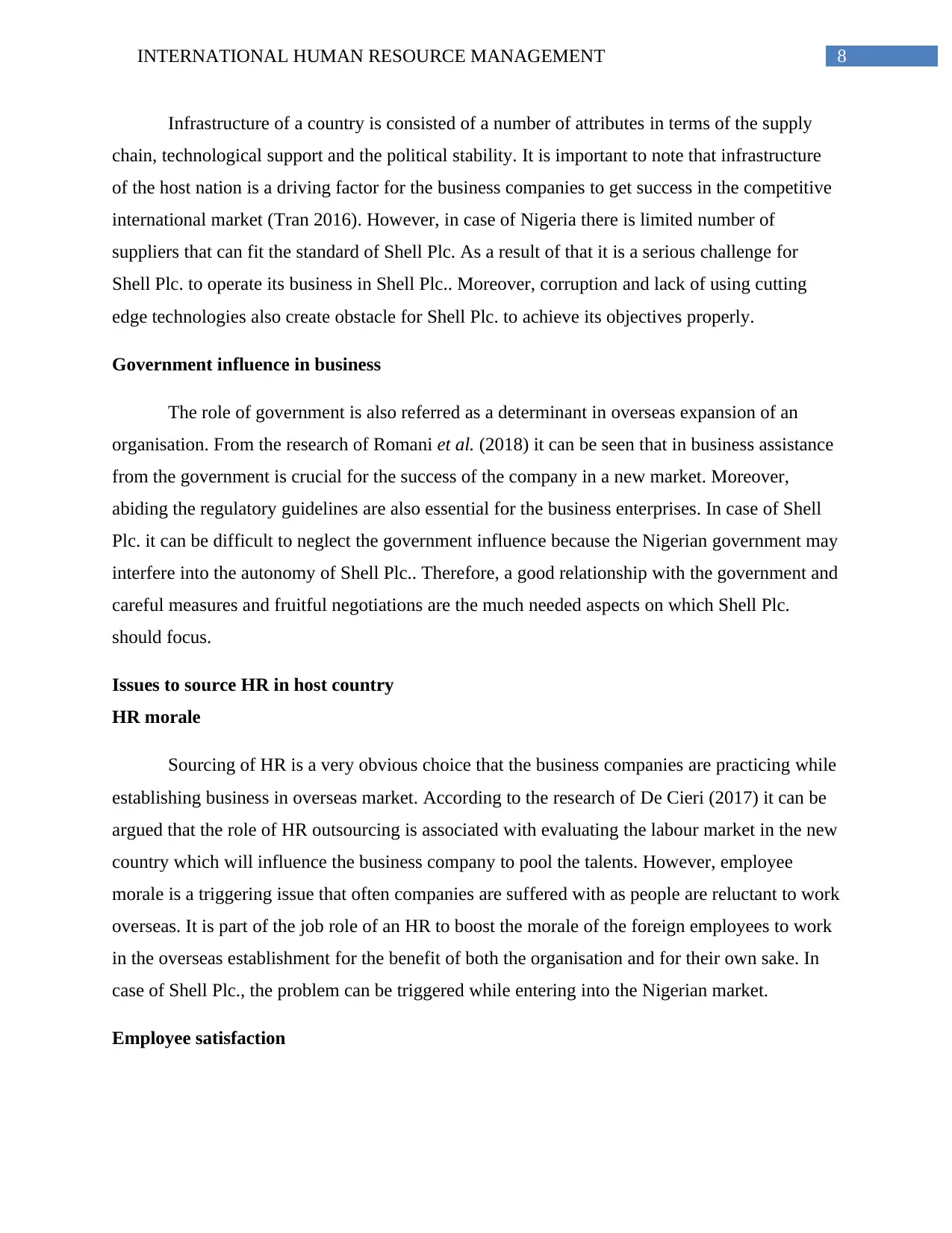
8INTERNATIONAL HUMAN RESOURCE MANAGEMENT
Infrastructure of a country is consisted of a number of attributes in terms of the supply
chain, technological support and the political stability. It is important to note that infrastructure
of the host nation is a driving factor for the business companies to get success in the competitive
international market (Tran 2016). However, in case of Nigeria there is limited number of
suppliers that can fit the standard of Shell Plc. As a result of that it is a serious challenge for
Shell Plc. to operate its business in Shell Plc.. Moreover, corruption and lack of using cutting
edge technologies also create obstacle for Shell Plc. to achieve its objectives properly.
Government influence in business
The role of government is also referred as a determinant in overseas expansion of an
organisation. From the research of Romani et al. (2018) it can be seen that in business assistance
from the government is crucial for the success of the company in a new market. Moreover,
abiding the regulatory guidelines are also essential for the business enterprises. In case of Shell
Plc. it can be difficult to neglect the government influence because the Nigerian government may
interfere into the autonomy of Shell Plc.. Therefore, a good relationship with the government and
careful measures and fruitful negotiations are the much needed aspects on which Shell Plc.
should focus.
Issues to source HR in host country
HR morale
Sourcing of HR is a very obvious choice that the business companies are practicing while
establishing business in overseas market. According to the research of De Cieri (2017) it can be
argued that the role of HR outsourcing is associated with evaluating the labour market in the new
country which will influence the business company to pool the talents. However, employee
morale is a triggering issue that often companies are suffered with as people are reluctant to work
overseas. It is part of the job role of an HR to boost the morale of the foreign employees to work
in the overseas establishment for the benefit of both the organisation and for their own sake. In
case of Shell Plc., the problem can be triggered while entering into the Nigerian market.
Employee satisfaction
Infrastructure of a country is consisted of a number of attributes in terms of the supply
chain, technological support and the political stability. It is important to note that infrastructure
of the host nation is a driving factor for the business companies to get success in the competitive
international market (Tran 2016). However, in case of Nigeria there is limited number of
suppliers that can fit the standard of Shell Plc. As a result of that it is a serious challenge for
Shell Plc. to operate its business in Shell Plc.. Moreover, corruption and lack of using cutting
edge technologies also create obstacle for Shell Plc. to achieve its objectives properly.
Government influence in business
The role of government is also referred as a determinant in overseas expansion of an
organisation. From the research of Romani et al. (2018) it can be seen that in business assistance
from the government is crucial for the success of the company in a new market. Moreover,
abiding the regulatory guidelines are also essential for the business enterprises. In case of Shell
Plc. it can be difficult to neglect the government influence because the Nigerian government may
interfere into the autonomy of Shell Plc.. Therefore, a good relationship with the government and
careful measures and fruitful negotiations are the much needed aspects on which Shell Plc.
should focus.
Issues to source HR in host country
HR morale
Sourcing of HR is a very obvious choice that the business companies are practicing while
establishing business in overseas market. According to the research of De Cieri (2017) it can be
argued that the role of HR outsourcing is associated with evaluating the labour market in the new
country which will influence the business company to pool the talents. However, employee
morale is a triggering issue that often companies are suffered with as people are reluctant to work
overseas. It is part of the job role of an HR to boost the morale of the foreign employees to work
in the overseas establishment for the benefit of both the organisation and for their own sake. In
case of Shell Plc., the problem can be triggered while entering into the Nigerian market.
Employee satisfaction
⊘ This is a preview!⊘
Do you want full access?
Subscribe today to unlock all pages.

Trusted by 1+ million students worldwide
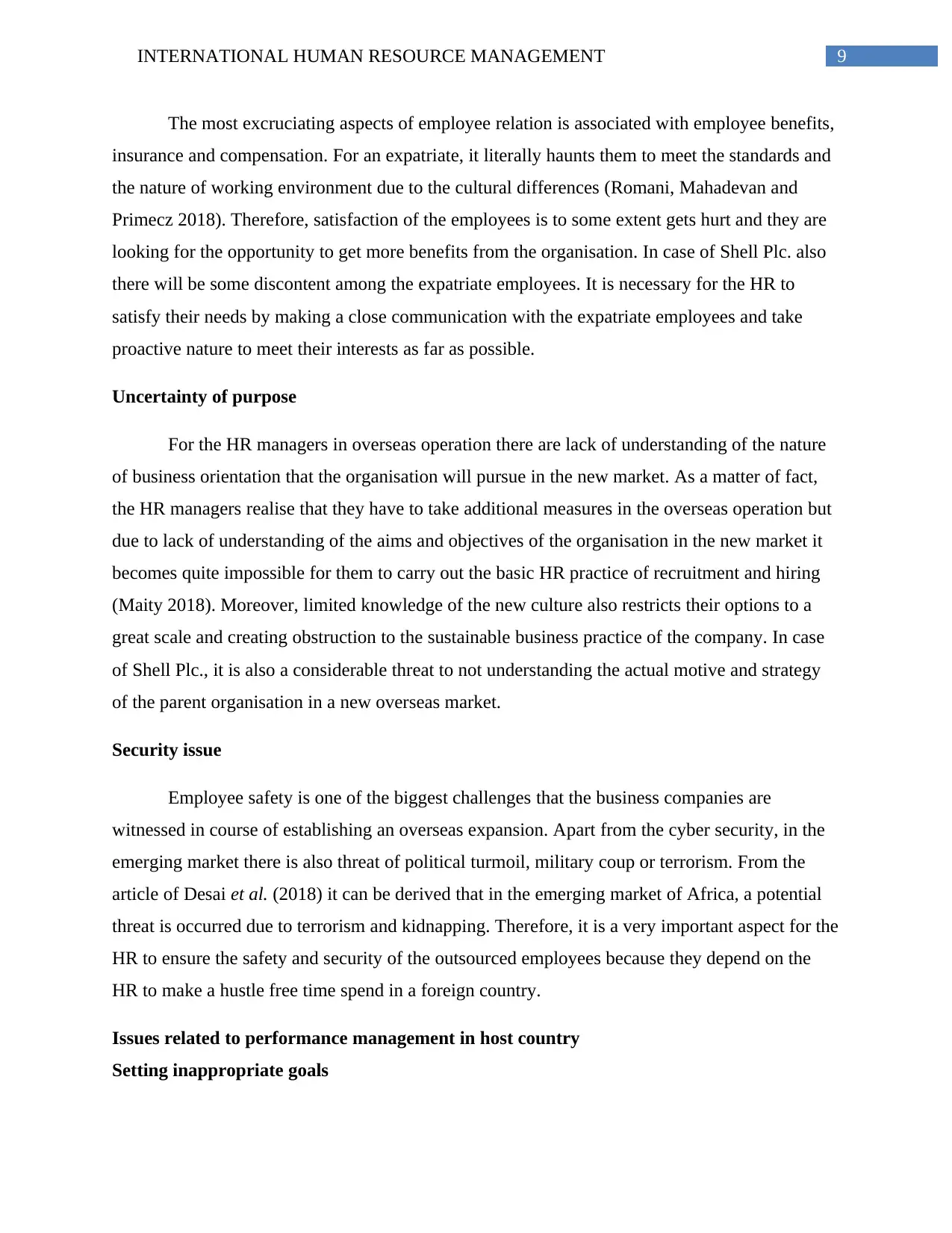
9INTERNATIONAL HUMAN RESOURCE MANAGEMENT
The most excruciating aspects of employee relation is associated with employee benefits,
insurance and compensation. For an expatriate, it literally haunts them to meet the standards and
the nature of working environment due to the cultural differences (Romani, Mahadevan and
Primecz 2018). Therefore, satisfaction of the employees is to some extent gets hurt and they are
looking for the opportunity to get more benefits from the organisation. In case of Shell Plc. also
there will be some discontent among the expatriate employees. It is necessary for the HR to
satisfy their needs by making a close communication with the expatriate employees and take
proactive nature to meet their interests as far as possible.
Uncertainty of purpose
For the HR managers in overseas operation there are lack of understanding of the nature
of business orientation that the organisation will pursue in the new market. As a matter of fact,
the HR managers realise that they have to take additional measures in the overseas operation but
due to lack of understanding of the aims and objectives of the organisation in the new market it
becomes quite impossible for them to carry out the basic HR practice of recruitment and hiring
(Maity 2018). Moreover, limited knowledge of the new culture also restricts their options to a
great scale and creating obstruction to the sustainable business practice of the company. In case
of Shell Plc., it is also a considerable threat to not understanding the actual motive and strategy
of the parent organisation in a new overseas market.
Security issue
Employee safety is one of the biggest challenges that the business companies are
witnessed in course of establishing an overseas expansion. Apart from the cyber security, in the
emerging market there is also threat of political turmoil, military coup or terrorism. From the
article of Desai et al. (2018) it can be derived that in the emerging market of Africa, a potential
threat is occurred due to terrorism and kidnapping. Therefore, it is a very important aspect for the
HR to ensure the safety and security of the outsourced employees because they depend on the
HR to make a hustle free time spend in a foreign country.
Issues related to performance management in host country
Setting inappropriate goals
The most excruciating aspects of employee relation is associated with employee benefits,
insurance and compensation. For an expatriate, it literally haunts them to meet the standards and
the nature of working environment due to the cultural differences (Romani, Mahadevan and
Primecz 2018). Therefore, satisfaction of the employees is to some extent gets hurt and they are
looking for the opportunity to get more benefits from the organisation. In case of Shell Plc. also
there will be some discontent among the expatriate employees. It is necessary for the HR to
satisfy their needs by making a close communication with the expatriate employees and take
proactive nature to meet their interests as far as possible.
Uncertainty of purpose
For the HR managers in overseas operation there are lack of understanding of the nature
of business orientation that the organisation will pursue in the new market. As a matter of fact,
the HR managers realise that they have to take additional measures in the overseas operation but
due to lack of understanding of the aims and objectives of the organisation in the new market it
becomes quite impossible for them to carry out the basic HR practice of recruitment and hiring
(Maity 2018). Moreover, limited knowledge of the new culture also restricts their options to a
great scale and creating obstruction to the sustainable business practice of the company. In case
of Shell Plc., it is also a considerable threat to not understanding the actual motive and strategy
of the parent organisation in a new overseas market.
Security issue
Employee safety is one of the biggest challenges that the business companies are
witnessed in course of establishing an overseas expansion. Apart from the cyber security, in the
emerging market there is also threat of political turmoil, military coup or terrorism. From the
article of Desai et al. (2018) it can be derived that in the emerging market of Africa, a potential
threat is occurred due to terrorism and kidnapping. Therefore, it is a very important aspect for the
HR to ensure the safety and security of the outsourced employees because they depend on the
HR to make a hustle free time spend in a foreign country.
Issues related to performance management in host country
Setting inappropriate goals
Paraphrase This Document
Need a fresh take? Get an instant paraphrase of this document with our AI Paraphraser
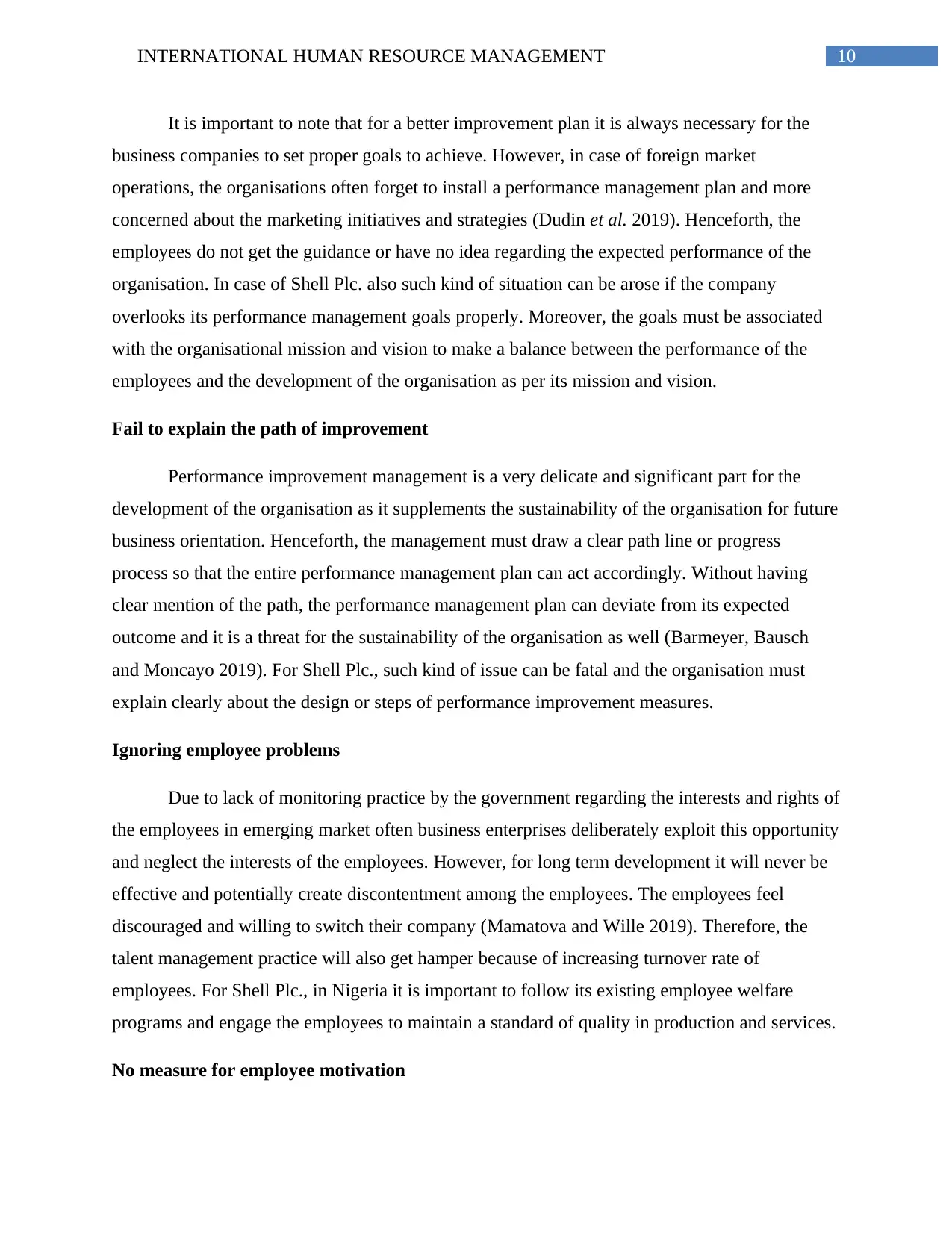
10INTERNATIONAL HUMAN RESOURCE MANAGEMENT
It is important to note that for a better improvement plan it is always necessary for the
business companies to set proper goals to achieve. However, in case of foreign market
operations, the organisations often forget to install a performance management plan and more
concerned about the marketing initiatives and strategies (Dudin et al. 2019). Henceforth, the
employees do not get the guidance or have no idea regarding the expected performance of the
organisation. In case of Shell Plc. also such kind of situation can be arose if the company
overlooks its performance management goals properly. Moreover, the goals must be associated
with the organisational mission and vision to make a balance between the performance of the
employees and the development of the organisation as per its mission and vision.
Fail to explain the path of improvement
Performance improvement management is a very delicate and significant part for the
development of the organisation as it supplements the sustainability of the organisation for future
business orientation. Henceforth, the management must draw a clear path line or progress
process so that the entire performance management plan can act accordingly. Without having
clear mention of the path, the performance management plan can deviate from its expected
outcome and it is a threat for the sustainability of the organisation as well (Barmeyer, Bausch
and Moncayo 2019). For Shell Plc., such kind of issue can be fatal and the organisation must
explain clearly about the design or steps of performance improvement measures.
Ignoring employee problems
Due to lack of monitoring practice by the government regarding the interests and rights of
the employees in emerging market often business enterprises deliberately exploit this opportunity
and neglect the interests of the employees. However, for long term development it will never be
effective and potentially create discontentment among the employees. The employees feel
discouraged and willing to switch their company (Mamatova and Wille 2019). Therefore, the
talent management practice will also get hamper because of increasing turnover rate of
employees. For Shell Plc., in Nigeria it is important to follow its existing employee welfare
programs and engage the employees to maintain a standard of quality in production and services.
No measure for employee motivation
It is important to note that for a better improvement plan it is always necessary for the
business companies to set proper goals to achieve. However, in case of foreign market
operations, the organisations often forget to install a performance management plan and more
concerned about the marketing initiatives and strategies (Dudin et al. 2019). Henceforth, the
employees do not get the guidance or have no idea regarding the expected performance of the
organisation. In case of Shell Plc. also such kind of situation can be arose if the company
overlooks its performance management goals properly. Moreover, the goals must be associated
with the organisational mission and vision to make a balance between the performance of the
employees and the development of the organisation as per its mission and vision.
Fail to explain the path of improvement
Performance improvement management is a very delicate and significant part for the
development of the organisation as it supplements the sustainability of the organisation for future
business orientation. Henceforth, the management must draw a clear path line or progress
process so that the entire performance management plan can act accordingly. Without having
clear mention of the path, the performance management plan can deviate from its expected
outcome and it is a threat for the sustainability of the organisation as well (Barmeyer, Bausch
and Moncayo 2019). For Shell Plc., such kind of issue can be fatal and the organisation must
explain clearly about the design or steps of performance improvement measures.
Ignoring employee problems
Due to lack of monitoring practice by the government regarding the interests and rights of
the employees in emerging market often business enterprises deliberately exploit this opportunity
and neglect the interests of the employees. However, for long term development it will never be
effective and potentially create discontentment among the employees. The employees feel
discouraged and willing to switch their company (Mamatova and Wille 2019). Therefore, the
talent management practice will also get hamper because of increasing turnover rate of
employees. For Shell Plc., in Nigeria it is important to follow its existing employee welfare
programs and engage the employees to maintain a standard of quality in production and services.
No measure for employee motivation
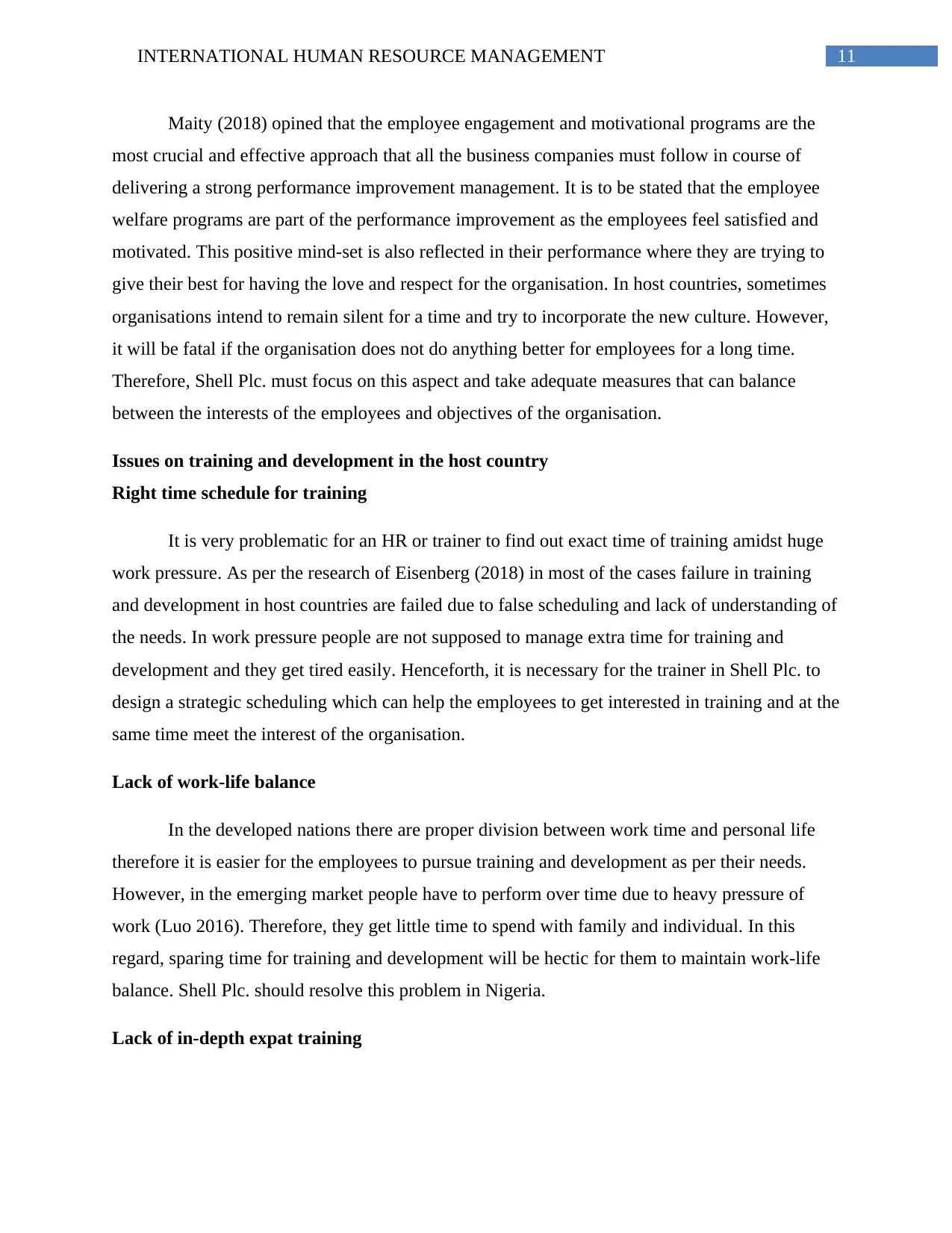
11INTERNATIONAL HUMAN RESOURCE MANAGEMENT
Maity (2018) opined that the employee engagement and motivational programs are the
most crucial and effective approach that all the business companies must follow in course of
delivering a strong performance improvement management. It is to be stated that the employee
welfare programs are part of the performance improvement as the employees feel satisfied and
motivated. This positive mind-set is also reflected in their performance where they are trying to
give their best for having the love and respect for the organisation. In host countries, sometimes
organisations intend to remain silent for a time and try to incorporate the new culture. However,
it will be fatal if the organisation does not do anything better for employees for a long time.
Therefore, Shell Plc. must focus on this aspect and take adequate measures that can balance
between the interests of the employees and objectives of the organisation.
Issues on training and development in the host country
Right time schedule for training
It is very problematic for an HR or trainer to find out exact time of training amidst huge
work pressure. As per the research of Eisenberg (2018) in most of the cases failure in training
and development in host countries are failed due to false scheduling and lack of understanding of
the needs. In work pressure people are not supposed to manage extra time for training and
development and they get tired easily. Henceforth, it is necessary for the trainer in Shell Plc. to
design a strategic scheduling which can help the employees to get interested in training and at the
same time meet the interest of the organisation.
Lack of work-life balance
In the developed nations there are proper division between work time and personal life
therefore it is easier for the employees to pursue training and development as per their needs.
However, in the emerging market people have to perform over time due to heavy pressure of
work (Luo 2016). Therefore, they get little time to spend with family and individual. In this
regard, sparing time for training and development will be hectic for them to maintain work-life
balance. Shell Plc. should resolve this problem in Nigeria.
Lack of in-depth expat training
Maity (2018) opined that the employee engagement and motivational programs are the
most crucial and effective approach that all the business companies must follow in course of
delivering a strong performance improvement management. It is to be stated that the employee
welfare programs are part of the performance improvement as the employees feel satisfied and
motivated. This positive mind-set is also reflected in their performance where they are trying to
give their best for having the love and respect for the organisation. In host countries, sometimes
organisations intend to remain silent for a time and try to incorporate the new culture. However,
it will be fatal if the organisation does not do anything better for employees for a long time.
Therefore, Shell Plc. must focus on this aspect and take adequate measures that can balance
between the interests of the employees and objectives of the organisation.
Issues on training and development in the host country
Right time schedule for training
It is very problematic for an HR or trainer to find out exact time of training amidst huge
work pressure. As per the research of Eisenberg (2018) in most of the cases failure in training
and development in host countries are failed due to false scheduling and lack of understanding of
the needs. In work pressure people are not supposed to manage extra time for training and
development and they get tired easily. Henceforth, it is necessary for the trainer in Shell Plc. to
design a strategic scheduling which can help the employees to get interested in training and at the
same time meet the interest of the organisation.
Lack of work-life balance
In the developed nations there are proper division between work time and personal life
therefore it is easier for the employees to pursue training and development as per their needs.
However, in the emerging market people have to perform over time due to heavy pressure of
work (Luo 2016). Therefore, they get little time to spend with family and individual. In this
regard, sparing time for training and development will be hectic for them to maintain work-life
balance. Shell Plc. should resolve this problem in Nigeria.
Lack of in-depth expat training
⊘ This is a preview!⊘
Do you want full access?
Subscribe today to unlock all pages.

Trusted by 1+ million students worldwide
1 out of 20
Related Documents
Your All-in-One AI-Powered Toolkit for Academic Success.
+13062052269
info@desklib.com
Available 24*7 on WhatsApp / Email
![[object Object]](/_next/static/media/star-bottom.7253800d.svg)
Unlock your academic potential
Copyright © 2020–2026 A2Z Services. All Rights Reserved. Developed and managed by ZUCOL.




